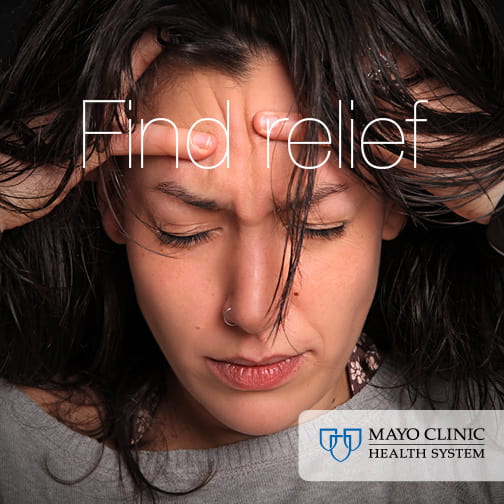6 tips for headache relief

It's common for adults to occasionally experience the tight, aching pain of a tension headache. According to the World Health Organization, about 50% of adults worldwide have had headaches in the last year and about 30% have migraines.
Headache pain can slow you down or even stop you in your tracks. It can be intense or a dull ache that lasts for a few days. Regardless of the exact symptoms, you want relief.
Here are six things you can do to help lessen headache intensity or frequency:
1. Exercise regularly.
Exercise is good for your body, but it also is good for your brain. Exercise is the most effective lifestyle change to significantly reduce headaches.
It's a natural stress reliever that lowers the tension that can trigger headaches and releases feel-good endorphins that block pain signals to the brain. Aim for 30 minutes of moderate exercise at least five days a week or 150 total minutes per week to experience the full benefit.
2. Limit caffeine.
Some over-the-counter headache medications include caffeine, and a small amount can help stop your headache. However, heavy caffeine use could be causing your headaches. Too much raises your blood pressure and can trigger a headache.
Overall, up to 400 milligrams of caffeine per day is considered safe for most adults. Soda and energy drinks can be particularly high in caffeine, so closely monitor your intake. Any reduction can help, so aim for no more than one cup of coffee or tea a day.
3. Eat a healthy diet.
Some people with chronic headaches or migraines have found relief by changing their diets to eliminate specific foods. For some, a specific food may trigger a headache. For others, certain chemicals in foods can create a trigger load that can reduce the threshold for developing a headache. Check seasoning ingredients, too, as many contain gluten, sugar, salt, preservatives, and artificial colors and flavors.
After eliminating potential trigger foods for some time, you can slowly reintroduce them one at a time. Some common foods to eliminate include highly processed foods, caffeine, chocolate, aged cheeses, processed meats high in nitrates, high-sugar foods, gluten and alcohol.
Some people find that moving their diet away from processed foods to whole, made-from-scratch foods has made a big difference in their headaches. In addition, you may find that a daily multivitamin and supplements of riboflavin and magnesium help with headaches.
4. Avoid substances.
It's no secret that alcohol, tobacco and illegal drugs affect your brain. Many people who have chronic headaches or migraines are sensitive to alcohol. Limit your alcohol intake to one drink a day if you're a women or two drinks a day if you're a man. If you smoke, quit.
5. Get enough sleep.
Sleep is essential to our well-being, and getting an adequate amount can help reduce headaches. You may find you don't need the recommended full eight hours per night, but it's important you get enough to feel like you're functioning well.
Avoid over- or under-sleeping, as this can trigger migraines. If you've been told you snore, talk to your health care provider about sleep apnea, which also can trigger headaches.
6. Relax and recharge.
Stress can make your head hurt, so find something you enjoy doing that reduces stress and gets your creative juices going. Headaches are more likely to occur when you're stressed, so do what you can to keep your stress level under control.
Make time to take care of yourself, whether going to an activity or staying home. If you aren't recharged by hanging out with others, then have something at home that helps you get in sync with yourself again.
As a bonus, these tips also help other health conditions, including heart disease, depression, Type 2 diabetes and high blood pressure.
Talk with your primary care provider if you have headaches occurring a few times per week, are debilitating, last more than one day, or interfere with your daily activities, such as missing work or life activities.
Kerri Crank is a nurse practitioner in Neurology in Eau Claire, Wisconsin.



